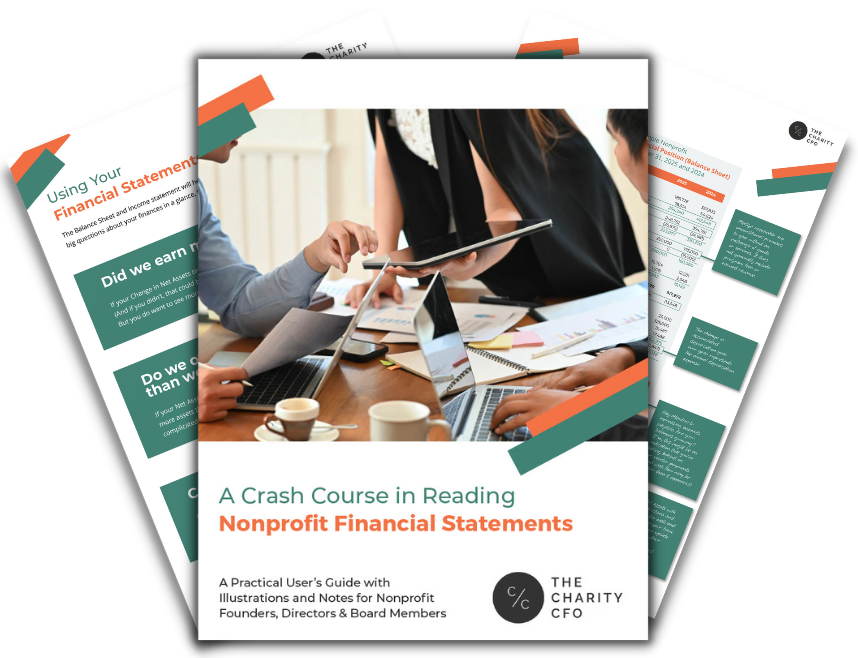The nonprofit sector is full of rewarding and impactful careers because it plays a crucial role in addressing various social, environmental, and humanitarian challenges. In this mission-driven landscape, nonprofit accounting jobs hold a significant role as they serve as the financial backbone that ensures organizations remain:
- Transparent
- Compliant
- Efficient in their operations
They go beyond traditional finance roles, as nonprofit accountants are required to:
- Understand the intricacies of nonprofit financial management
- Compliance with unique regulations
- Communicate financial data to stakeholders effectively
For people seeking a career that blends a passion for making a positive impact with their financial expertise, nonprofit accounting offers the best route.
Ready to dive deep into this exciting realm? In this complete guide, we will explore:
- Common myths associated with nonprofit accounting
- The biggest challenges in the accounting industry
- The role and responsibilities of a nonprofit accountant
- Why nonprofit expertise is crucial
- How a good culture benefits accountants and keeps an organization moving forward
Whether you are a seasoned accountant looking to transition into the nonprofit world or a recent graduate eager to make a difference, this guide will equip you with the knowledge and tools you need to navigate the nonprofit accounting industry.
Myths of Nonprofit Accounting and Why They Matter to Job Seekers
Unfortunately, many job seekers fall victim to the stereotypes and believe the myths surrounding nonprofit accounting. When job seekers lean into the falsities, they write off positions they could succeed in.
In this section, we will debunk the three most common nonprofit accounting myths.
Myth #1: Nonprofit Accounting is Completely Different from For-Profit Accounting
One reason accountants seeking a new role may steer clear of a nonprofit accounting position is that they assume the methods are completely different. However, most of it is actually the same.
On a basic level, the two key differences are:
- How/when revenue is tracked
- How ownership (or equity) is categorized
With respect to nonprofits, revenue is typically tracked when it is earned or pledged (a gift is promised) regardless if cash has been collected. In the for-profit world, revenue is typically only recorded when earned or cash has been collected.
In the for-profit world, businesses are owned by some party (individuals or other businesses). The value of this ownership is summarized as equity on the balance sheet. In the nonprofit world, there is no ownership of an organization. Because ownership doesn’t exist, we call equity net assets in the nonprofit sector. The net assets can be further tracked by those with donor restrictions and net assets without donor restrictions.
Neither of these key differences has a significant impact on how the accounting is handled. This means most of the knowledge job seekers have in for-profit accounting still applies to nonprofit accounting.
Myth #2: Nonprofits Cannot Make a Profit
Being classified as a “nonprofit” gives many people the impression that profits can’t or shouldn’t be made, which often turns accountants away from the industry. However, nonprofits CAN and SHOULD be generating a surplus (or, as the for-profit world calls it, a profit).
Like any business, nonprofits need more money coming in than what is being spent. This is the only way an organization can grow and expand.
For accountants, this means the profit-generating strategies and investment ideas you bring to the table are still applicable and can make a massive impact.
Myth #3: Nonprofit Accounting (GAAP) and the IRS Rules are the Same
Another common misconception is that GAAP and IRS rules are the same when it comes to nonprofits, however, they are not.
One key differentiator is that what is recorded following GAAP is what will show up on the audit and may not show up on the IRS tax form, Federal Form 990.
The IRS report only pays attention to tangible monetary value which means things like in-kind services or unrealized gains/losses on investments are excluded. The way functional expenses and special events are recorded may also differ.
All of these differences are summarized in the 990, a document unique to nonprofits.
Biggest Challenges in the Nonprofit Accounting Industry
There are plenty of challenges facing the accounting industry, nonprofit accounting included. These challenges are causing accountants to quit, change career paths, or hop from one job to another more quickly than they’d like.
Some of the challenges include:
- Limited opportunities for growth: In many organizations, once you’ve hit a certain level, there’s no room left for growth. This can stump your professional development and keep you from excelling in your career. Once this happens, it often leads to accountants leaving the position or the industry entirely.
- Underpaid and/or the department is underfunded: This is an understandable challenge and when it gets in the way, it leads to frustration and demotivation. This challenge is most often felt in in-house accounting positions, especially in the nonprofit sector.
- Outdated workplace: Technology isn’t the wave of the future, it’s an essential element in today’s workplace. Given the increasing use of accounting software to do day-to-day tasks, accountants need to not just be proficient in accounting, they have to be tech savvy. Accountants deserve positions that leverage technology to improve the department and the organization and when they don’t get that, it creates a challenge. When accountants are provided with the technology and tools they need to succeed, they can spend more time strategizing and implementing tactics to strengthen the organization’s financial position.
- Toxic workplace: A toxic workplace can be emotionally draining and leave an impact on your overall health. When this becomes a challenge, many employed accountants will quickly become job seekers. A good culture is the only solution to this challenge.
Accountants play a crucial role in any organization. Your talents are valuable, and finding a workplace that appreciates and nurtures them can make all the difference in your professional fulfillment. This is why it’s so essential to search for a workplace that acknowledges these challenges and puts all its efforts into correcting the issues.
If you are in a workplace where these challenges (and/or others) are becoming too much to handle, remind yourself that there are organizations working to address these concerns.
Understand the Role of a Nonprofit Accounting Job
An accountant’s role is crucial in ensuring the financial health of a nonprofit organization. Because of their tax-exempt status and the extra focus on fulfilling their mission, there are unique and specific responsibilities in the nonprofit sector.
Here are some of the key responsibilities in a nonprofit accounting job:
Financial Management
Nonprofit accountants are responsible for managing the organization’s financial activities, including:
- Budgeting
- Financial planning
- Record-keeping
To keep a clear picture of the organization’s financial standings, they track:
- Income, including donations and grants
- Expenses
- Cash balances to ensure sustainability
- Grant spending to ensure we spend funds in accordance with funder wishes
- And many more…
Strong financial management is one of the most important roles because, at the end of the day, this is the difference between a successful organization and an unsuccessful one.
Compliance
Like traditional accounting positions, nonprofit accountants have to ensure compliance with tax laws and regulations. However, they have slightly different rules to follow, so they have to make sure the organization aligns with the requirements of governing nonprofit entities.
To support and maintain the organization’s tax-exempt status, nonprofit accountants have to understand and adhere to IRS rules for:
- Tax-exempt organizations
- Reporting requirements
- Maintaining proper documentation
Reporting
Financial reports and statements provide a transparent view of the organization’s financial performance. These documents are helpful to internal stakeholders, like the board of directors, and external parties like:
- Donors
- Grantors
- Government agencies
- Financial statement auditors
These reports allow interested parties to make informed decisions and keep a pulse of the organization’s financial health.
Grant Management
Many nonprofit organizations rely on grants and donations to fund their operations and programs. These grants often require specific tracking guidelines and reporting.
It’s the accountant’s job to properly manage grant funds and ensure that they are meeting the grant guidelines and creating the proper reports. In some cases, they’ll also be responsible for communicating with grantors.
Not only are accountants included in the management of grants like tracking how the funds are spent, they are also involved in the fundraising process by building budgets to justify the request. Fundraising and accounting typically work in tandem to strategize on what fundraising gaps exist and how to best ask for funding.
Fund Accounting
Fund accounting is primarily used by non-profit organizations, government entities, and some financial institutions to track and manage financial resources that are segregated into separate funds or accounts.
This method helps to ensure that resources are allocated and used according to specific:
- Purposes
- Programs
- Projects
- Restrictions
- Donor intentions
It’s the accountant’s role to help allocate expenses and revenues to the correct funds to ensure accountability and transparency.
Internal Controls
Unfortunately, fraud, mismanagement of funds, and financial irregularities can happen often in the nonprofit sector. However, implementing and maintaining strong internal controls is the best way to prevent these things from happening.
It’s the role of nonprofit accountants to help establish and enforce these controls to protect the organization’s assets.
Budgeting and Planning
Budgeting and planning are two essential aspects of a nonprofit accounting system. It’s the accountant’s responsibility to participate in the budgeting process. They’ll have the insight needed to make accurate decisions and craft a well-rounded budget.
Nonprofit accountants should also collaborate with program managers and leadership to create realistic financial plans. This collaboration will ensure the plans align with the organization’s mission and objectives.
It might be a surprise to some that nonprofits typically have multiple budgets. An organization typically has a company-wide budget that serves as its overall financial framework. Additionally, a nonprofit will have grant budgets for each of its funding sources. The grant budgets are typically a subset of the organizational budget.
Audits
Nonprofits are not exempt from audits. In fact, many states require audits for larger organizations. Accountants typically work closely with external auditors during the annual audit process.
This ensures all of the financial statements are accurate and meet accounting standards.
Nonprofit Expertise is Crucial
The roles of an accountant are essential to keep a nonprofit moving towards its mission. While many of these roles are similar to those of a traditional business, it’s still advantageous for accountants to have nonprofit expertise.
Here are several reasons why expertise is crucial in nonprofit accounting:
Unique Financial Reporting
Nonprofit organizations and for-profit entities have different financial reporting requirements.
To be successful, nonprofit accountants have to understand and follow the accounting standards and regulations that are specific to the nonprofit sector. One example of this is the Financial Accounting Standards Board (FASB) guidelines for nonprofit organizations.
Having expertise in nonprofit accounting will ensure the financial statements are prepared accurately and according to the unique reporting standards.
Compliance with Tax Regulations
Tax-exempt statuses are unique to nonprofit organizations, but to maintain these statuses, they have to comply with specific tax laws and regulations.
This means nonprofit accountants need a deep understanding of the tax code to ensure the organization meets all of the tax-related requirements.
If an organization doesn’t comply with the regulations it can jeopardize its tax-exempt status and lead to financial and legal consequences.
Fund Accounting
As mentioned previously, fund accounting is uniquely used by nonprofits to manage and report on resources that are assigned for specific purposes.
This approach requires a strong understanding of the nonprofit and how to allocate revenues and expenses to different funds.
Donor Restrictions and Reporting
It’s not unusual for nonprofits to receive donations and grants that come with restrictions on how they should be used.
Understanding and properly accounting for these donor-imposed restrictions is essential to succeed in a nonprofit accounting role. This ensures funds are used as intended and lets donors see that their donations are being used as intended.
Grant Management
Again, grant management is a key responsibility that is unique to nonprofit accountants. Expertise in this area is successful in order to manage grants effectively.
To properly manage grants, nonprofit accountants will need to know how to:
- Build a budget
- Track expenses
- Meet reporting requirements (which are sometimes set by the grantor)
- Comply with grant restrictions (ex: how the grant is used)
Mission-Driven Focus
Nonprofit organizations are driven by their mission and are determined to make a positive impact.
Expertise in the nonprofit sector will allow accountants to better align financial strategies with the organization’s mission and goals. When financial strategies and the mission is aligned it ensures financial resources are being used to make the most impact.
Financial Stewardship
The nature of nonprofits makes good financial stewardship even more of a priority. Accountants are required to protect the organization’s assets and maintain the trust of stakeholders, like:
- Donors
- Board members
- Beneficiaries
- Employees
- The public
With expertise in the industry, nonprofit accountants can maintain transparency and accountability in financial practices, ultimately enhancing the organization’s reputation and credibility.
Good Culture Keeps the Organization Moving Forward
Working for a nonprofit organization can be tough. There are a lot of moving pieces and the work can be stressful at times. However, a good culture is one of the best ways to ease that burden. It plays a critical role in keeping an organization and its hard-working employees moving forward.
Here are some of the many ways a good culture positively impacts a nonprofit organization:
Promotes Collaboration and Teamwork
Collaboration and teamwork are some of the most underrated aspects of nonprofit success. To foster these two concepts, there has to be a positive culture. This encourages open communication and trust among employees and creates a comfortable environment for sharing:
- Ideas
- Concerns
- Feedback
This leads to diverse perspectives and innovative solutions to challenges, further propelling the organization forward.
Additionally, a teamwork-focused environment reinforces the idea that everyone has a shared sense of purpose and is working towards a common goal to further the organization’s mission.
When you work in an environment that prioritizes these things, you’ll never have to wonder if everyone has the same goals.
Learning and Professional Development
A good culture can help combat one of the biggest challenges for nonprofit accountants, limited opportunities for growth.
Good cultures value continuous learning and provide opportunities for professional development. Organizations that promote this encourage employees to enhance their skills and knowledge so they can further themselves professionally and become more effective contributors to the organization.
Innovation and Risk-Taking
Nonprofits thrive on creativity and new ideas. A culture that promotes innovation and risk-taking opens the door for these contributions.
As a nonprofit accountant, you need the encouragement to share your thoughts and solutions so that you can contribute to the organization using your unique skill set.
Working with an organization that supports calculated risk-taking is more likely to seize opportunities and stay ahead of the competition, which is a benefit to you as an employee.
Value-Focused
A strong culture that emphasizes the organization’s core values helps employees align their work with the organization’s mission and vision.
A value-focused environment cultivates a sense of pride and ownership in the work employees do. It helps them understand how their contributions add value to the organization and the community it serves.
As an accountant, there are several key values you want the organizations you work with to hold in high regard, some of these include:
- Growth-minded
- Impactful
- Collaborative
- Supportive
- Transparent
- Driven
- Inclusive
- Progressive
An organization that leans into the majority of these values will have the best chance to provide you with a good culture.
The Ideal Nonprofit Accounting Job
With all of this being said, here is the good news: the ideal nonprofit accounting job DOES exist. There are plenty of organizations where you can find a good culture, good pay, opportunities for growth, and modern strategies. In fact, many nonprofit accountants work at a nonprofit organization. That said, this is not the only option!
However, if you’re searching for an in-house nonprofit accounting position, you may want to shift gears.
The Charity CFO is an outsourced accounting firm for nonprofit organizations. We work with hundreds of nonprofits to provide bookkeeping and accounting support so they can focus on their mission.
It’s our goal to create an environment where accountants can find work with a purpose and advance their professional journey. We want to make sure you have a space to be a person first and an accountant second.
Because there are so many organizations in need of bookkeeping and accounting support, The Charity CFO is looking to hire knowledgeable accountants with a passion for nonprofits. We are a growing firm and strongly believe we can provide you with the ideal nonprofit accounting job and a work environment that empowers you to grow personally and professionally. Our team is here to ensure that all nonprofits have the financial expertise they need to make informed decisions on how to best run their organization.
At The Charity CFO, our journey began with a former nonprofit CFO’s vision. Today, we’re proud to bring on board accountants who share a passion for nonprofit accounting, even if they’re new to the field. Alternatively, we’ve welcomed individuals with nonprofit backgrounds seeking a dynamic change. Our firm breaks the mold purposefully, targeting the challenges that often hold back for-profit accountings in search of purpose or nonprofit accountants aiming for greater resources and career development.
If you’re interested in learning more about career opportunities with The Charity CFO, visit our careers page.

Do You Struggle to Make Sense of Your Financial Statements?
Get our FREE GUIDE to nonprofit financial reports, featuring illustrations, annotations, and insights to help you better understand your organization's finances.
Get the free guide!




0 Comments